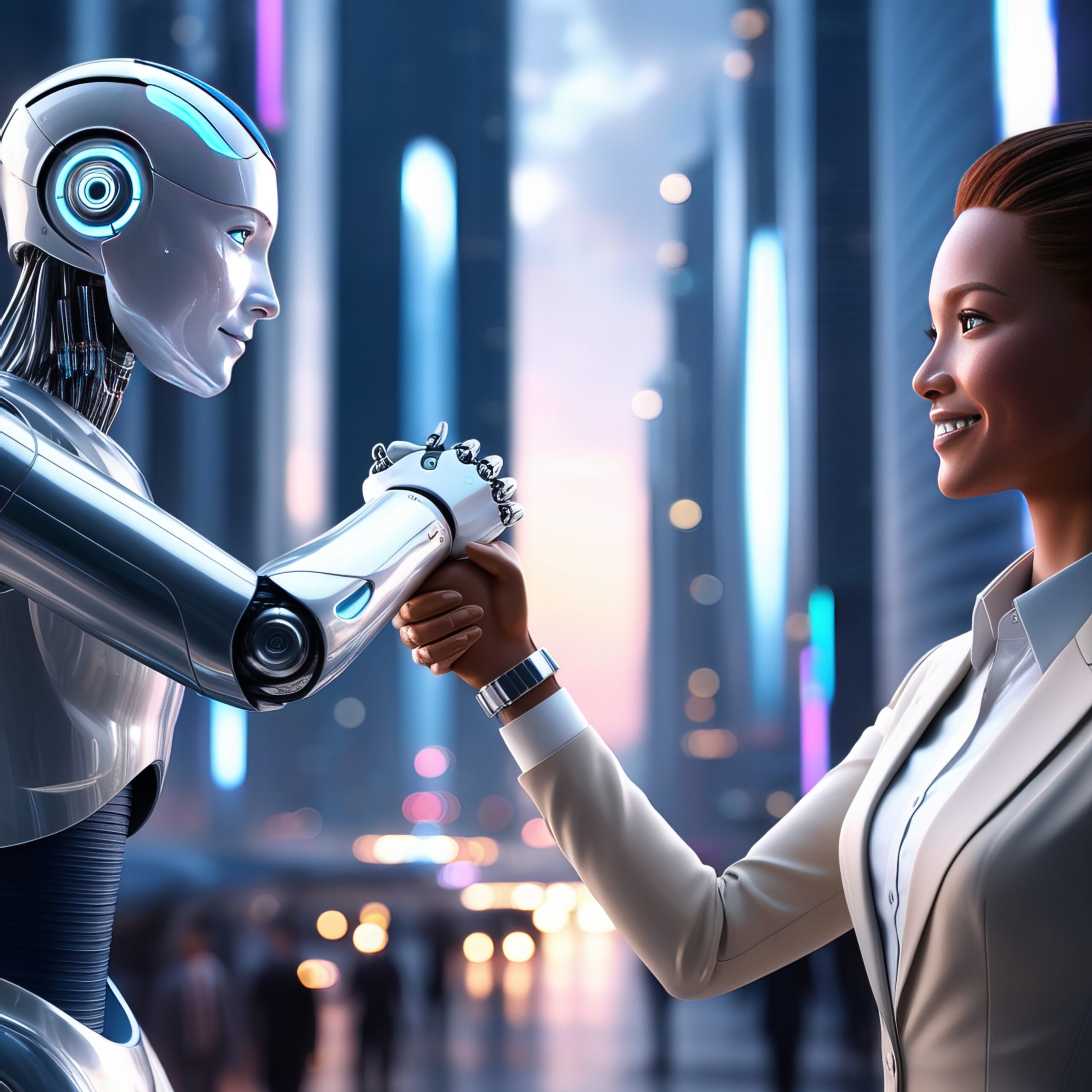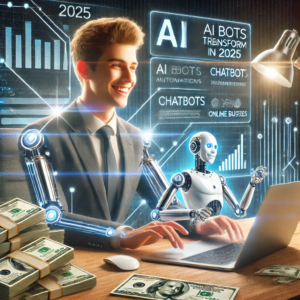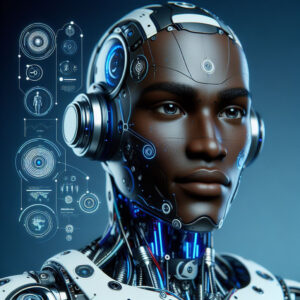10 Ways AI Taking Jobs is Reshaping the Job Market
The Rise of Artificial Intelligence in the Workforce:
Robots and algorithms are marching into offices, factories, and shops worldwide, with AI taking jobs at an unprecedented rate.
This technological revolution is reshaping the job market in ways both exciting and unsettling.
As machines become increasingly capable, they’re not just handling repetitive tasks but also venturing into roles once thought to be uniquely human.
The impact of AI taking jobs is rippling through industries, forcing us to reconsider what it means to work and succeed in the 21st century.
From healthcare to finance, manufacturing to creative fields, no sector remains untouched by this digital transformation.
But what exactly does this mean for the average worker, the fresh graduate, or the seasoned professional?
How can we adapt to a world where AI is not just a tool but a potential colleague or even a competitor?
In this comprehensive exploration, we’ll delve into the ten most significant ways AI taking jobs is reshaping the job market, offering insights and strategies for thriving in this new landscape.
We strongly recommend that you check out our guide on how to take advantage of AI in today’s passive income economy.
Table of Contents
1. Automation of Routine Tasks
The most immediate and visible impact of AI taking jobs is the automation of routine, repetitive tasks across various industries.
This shift is particularly pronounced in sectors like manufacturing, where robotic arms and automated assembly lines have become commonplace.
However, it’s not just blue-collar jobs that are affected; white-collar professions are also seeing significant changes.
In offices around the world, AI-powered software is taking over data entry, basic analysis, and even some customer service roles.
For instance, chatbots are handling an increasing number of customer inquiries, reducing the need for human representatives.
This trend of AI taking jobs that involve routine tasks is leading to a restructuring of many entry-level positions.
Companies are finding that they can operate more efficiently with fewer employees, leading to concerns about job displacement.
However, this shift also creates opportunities for workers to focus on more complex, creative, and interpersonal tasks that AI cannot easily replicate.
2. Enhanced Productivity and Efficiency
While the prospect of AI taking jobs may seem daunting, it’s important to recognize that AI is also significantly enhancing productivity and efficiency in many fields.
This increased productivity can lead to economic growth and the creation of new job opportunities in unexpected areas.
For example, in the healthcare sector, AI is assisting doctors in diagnosing diseases more accurately and quickly, allowing them to see more patients and provide better care.
In the legal field, AI-powered tools are streamlining document review processes, enabling lawyers to focus on more complex legal strategies.
This boost in productivity doesn’t necessarily mean fewer jobs overall; rather, it often results in a shift in the types of jobs available.
Workers who can effectively collaborate with AI tools are finding themselves in high demand.
The key to thriving in this new environment is to develop skills that complement AI capabilities, rather than compete with them.
By embracing AI as a tool for enhancement rather than replacement, workers can position themselves for success in the evolving job market.
3. Creation of New Job Categories
As AI continues reshaping industries, it’s not just taking jobs away; it’s also creating entirely new job categories that didn’t exist a decade ago.
The field of AI itself has spawned a plethora of new roles, from machine learning engineers to AI ethics consultants.
These positions require a blend of technical knowledge and critical thinking skills that are uniquely human.
Beyond the tech sector, AI is creating jobs in unexpected areas.
For instance, the rise of e-commerce, powered by AI algorithms, has led to an increased demand for logistics specialists and last-mile delivery drivers.
Data has become the new oil, and with AI’s ability to process vast amounts of information, data-related jobs are booming.
Data scientists, analysts, and privacy experts are now some of the most sought-after professionals in the job market.
The key takeaway is that while AI is undoubtedly taking jobs in some areas, it’s also opening up new avenues for employment and career growth.
4. Shift in Required Skills
The advent of AI taking jobs is fundamentally altering the skill sets required in the modern workforce.
Technical skills, particularly in areas like coding, data analysis, and machine learning, are becoming increasingly valuable across industries.
However, it’s not just technical prowess that’s in demand; soft skills are gaining newfound importance.
As AI handles more routine tasks, human workers are being called upon to excel in areas where machines fall short.
Creativity, emotional intelligence, critical thinking, and complex problem-solving are becoming crucial differentiators in the job market.
The ability to work alongside AI systems, understanding their capabilities and limitations, is emerging as a vital skill in itself.
This shift is prompting a reevaluation of education and training programs to prepare workers for this new reality.
Lifelong learning and adaptability are becoming essential traits for those looking to remain competitive in a job market reshaped by AI.
5. Transformation of Traditional Industries
AI taking jobs is not just affecting new and tech-centric fields; it’s also dramatically transforming traditional industries.
Agriculture, for instance, is seeing a revolution with AI-powered precision farming techniques that optimize crop yields and reduce waste.
In manufacturing, smart factories equipped with AI systems are changing the nature of production work, requiring fewer but more skilled workers.
The financial sector is another area experiencing significant upheaval due to AI.
Robo-advisors are taking on roles traditionally held by human financial planners, while AI algorithms are being used for fraud detection and risk assessment.
Even creative industries are not immune to this transformation.
AI is being used in music composition, art creation, and even journalism, challenging our perceptions of creativity and authorship.
This widespread transformation is forcing workers in these industries to adapt, upskill, and find new ways to add value.
The key to survival in these evolving industries is to embrace change and find ways to work alongside AI rather than against it.
6. Increased Focus on Human-Centric Skills
As AI continues taking jobs that involve routine or analytical tasks, there’s a growing emphasis on uniquely human skills in the workplace.
Empathy, emotional intelligence, and the ability to build meaningful relationships are becoming increasingly valuable.
In customer service, for example, while chatbots handle basic inquiries, human agents are now focused on complex, emotionally nuanced interactions.
Leadership and management roles are also evolving in response to AI’s capabilities.
The ability to inspire, motivate, and guide teams through change is more crucial than ever.
Creative problem-solving and innovation are areas where humans still have a significant edge over AI.
Companies are placing a premium on employees who can think outside the box and come up with novel solutions to complex problems.
This shift towards human-centric skills is reshaping job descriptions and hiring practices across industries.
It’s clear that while AI is taking jobs in some areas, it’s also highlighting the irreplaceable value of human qualities in others.
7. Restructuring of Organizational Hierarchies
The integration of AI into the workplace is not just changing individual jobs; it’s reshaping entire organizational structures.
Traditional hierarchies are flattening as AI takes over many middle-management functions like data analysis and routine decision-making.
This flattening of organizations is leading to more agile and flexible work environments, where cross-functional teams collaborate on projects.
AI’s ability to process vast amounts of data and provide insights is empowering lower-level employees to make more informed decisions.
This democratization of information is challenging traditional top-down management styles.
New roles are emerging to bridge the gap between AI systems and human workers, such as AI translators and ethics officers.
These changes are requiring companies to rethink their organizational charts and redefine roles and responsibilities.
The result is a more dynamic workplace where adaptability and continuous learning are prized over rigid job descriptions and traditional career paths.
8. Shift in Education and Training
The reality of AI taking jobs is prompting a significant overhaul in education and training systems worldwide.
Traditional educational models are being challenged to keep pace with the rapidly evolving job market.
There’s a growing emphasis on STEM (Science, Technology, Engineering, and Mathematics) education to prepare students for AI-driven careers.
However, it’s not just technical skills that are in focus; there’s also a renewed appreciation for liberal arts education.
The critical thinking, creativity, and communication skills honed in these programs are increasingly valuable in an AI-dominated workplace.
Continuous learning and upskilling are becoming the norm, with many companies investing heavily in employee training programs.
Online learning platforms and MOOCs (Massive Open Online Courses) are making it easier for individuals to acquire new skills throughout their careers.
The education sector itself is being transformed by AI, with personalized learning experiences and AI tutors becoming more common.
9. Ethical Considerations and Job Market Regulations
As AI continues taking jobs at an unprecedented rate, ethical considerations and regulatory challenges are coming to the forefront.
Questions about the fairness of AI decision-making in hiring and promotion processes are sparking debates and legal scrutiny.
There’s growing concern about the potential for AI to perpetuate or even exacerbate existing biases in the job market.
Governments and organizations are grappling with how to regulate AI in the workplace to ensure fairness and protect workers’ rights.
The issue of job displacement is prompting discussions about universal basic income and other social safety net measures.
Privacy concerns are also emerging, as AI systems often require vast amounts of data to function effectively.
These ethical and regulatory challenges are creating new job opportunities for ethicists, policy makers, and legal experts specializing in AI.
As the job market evolves, finding the right balance between leveraging AI’s benefits and protecting human workers will be crucial.
10. Global Impact and Workforce Migration
The impact of AI taking jobs is not confined to individual countries or regions; it’s a global phenomenon reshaping the international job market.
Developing countries that have relied on outsourcing and low-cost labor are particularly vulnerable to job displacement by AI.
This shift is leading to new patterns of workforce migration, as workers seek opportunities in areas less affected by automation.
At the same time, countries and regions that are at the forefront of AI development are experiencing a boom in high-skilled tech jobs.
This is creating a new kind of “brain drain” as AI experts are recruited globally, often concentrating in tech hubs.
The gig economy is expanding, powered by AI platforms that match freelancers with projects around the world.
Remote work, facilitated by AI tools, is becoming more common, allowing companies to tap into global talent pools.
These changes are redrawing the map of global economic opportunities and challenging traditional notions of local job markets.
Conclusion:
The phenomenon of AI taking jobs is undoubtedly reshaping the job market in profound and far-reaching ways.
From automating routine tasks to creating entirely new job categories, the impact of AI is being felt across all sectors and industries.
While there are valid concerns about job displacement, it’s clear that AI is also opening up new opportunities and avenues for growth.
The key to thriving in this new landscape lies in adaptability, continuous learning, and a willingness to embrace change.
As we’ve seen, uniquely human skills like creativity, empathy, and complex problem-solving are becoming more valuable than ever.
The future of work will likely be characterized by a symbiotic relationship between humans and AI, each complementing the other’s strengths.
For individuals, the path forward involves staying informed about AI developments, continuously updating skills, and focusing on areas where human abilities shine.
For organizations and policymakers, the challenge lies in creating supportive environments that facilitate this transition and ensure that the benefits of AI are distributed fairly.
As we navigate this new era, it’s crucial to approach the changes brought by AI with a balance of optimism and pragmatism.
By doing so, we can harness the potential of AI to create a more productive, innovative, and ultimately more human-centric job market.
FAQs:
What jobs are AI taking over?
AI is increasingly automating tasks in various sectors, leading to changes in job roles and responsibilities. Some jobs and tasks being taken over by AI include:
- Customer Service Representatives: AI chatbots and virtual assistants handle routine inquiries, support requests, and basic troubleshooting.
- Data Entry Clerks: AI systems can automate repetitive data entry tasks, reducing the need for manual input.
- Manufacturing Jobs: Robots and automated systems are increasingly used for tasks such as assembly, quality control, and material handling in manufacturing.
- Retail Associates: AI-driven systems are being used for inventory management, checkout processes, and personalized recommendations in retail.
- Transportation: Autonomous vehicles and drones are starting to impact jobs related to delivery and transportation.
How many jobs has AI taken?
Quantifying the exact number of jobs taken by AI can be challenging, as the impact varies by industry and region. However, AI has significantly affected certain sectors:
- Studies and Reports: Various studies estimate that AI and automation could impact millions of jobs worldwide. For example, a report from McKinsey & Company suggests that automation could affect up to 30% of the global workforce by 2030.
- Industry-Specific Data: In sectors like manufacturing and retail, AI and automation have already led to noticeable job reductions and shifts in job functions.
The impact of AI on jobs is ongoing and continues to evolve as technology advances.
Is AI going to take your job?
Whether AI will take your job depends on several factors:
- Industry and Role: Jobs that involve repetitive tasks, data processing, or predictable environments are more susceptible to automation. Conversely, roles requiring complex problem-solving, creativity, and human interaction are less likely to be fully automated.
- Adaptability: Individuals who can adapt to new technologies, acquire new skills, and focus on areas where human expertise is essential are less likely to be negatively affected.
- Job Evolution: In many cases, AI will not eliminate jobs but will transform them, requiring workers to adapt and acquire new skills.
Will AI take 20% of all jobs?
Predictions about the percentage of jobs AI will impact vary, but estimates often suggest significant effects:
- General Estimates: Various studies suggest that AI and automation could affect a substantial portion of jobs, with estimates ranging from 10% to 30% of jobs potentially being impacted in the coming years.
- Contextual Impact: The actual percentage depends on industry, job type, and regional factors. Jobs involving routine and repetitive tasks are more likely to be automated, while those requiring human creativity and interaction may be less affected.
AI’s impact on the job market is complex and will vary by sector and individual circumstances. Adapting to technological changes and focusing on skills that complement AI can help mitigate potential negative effects.

We strongly recommend that you check out our guide on how to take advantage of AI in today’s passive income economy.




